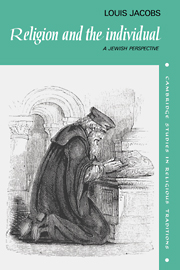Book contents
- Frontmatter
- Contents
- Preface
- List of abbreviations
- 1 Individual significance
- 2 Self-realization as a religious value
- 3 Attitudes to life and death
- 4 Family relationships
- 5 Loving the neighbour
- 6 Communal obligations
- 7 God and the soul
- 8 Does a person's body belong to God?
- 9 Worship with the body
- 10 God and personal freedom
- 11 Immortality
- 12 Conclusion: A question of emphasis
- Glossary
- Notes
- Bibliography
- Index
12 - Conclusion: A question of emphasis
Published online by Cambridge University Press: 11 October 2009
- Frontmatter
- Contents
- Preface
- List of abbreviations
- 1 Individual significance
- 2 Self-realization as a religious value
- 3 Attitudes to life and death
- 4 Family relationships
- 5 Loving the neighbour
- 6 Communal obligations
- 7 God and the soul
- 8 Does a person's body belong to God?
- 9 Worship with the body
- 10 God and personal freedom
- 11 Immortality
- 12 Conclusion: A question of emphasis
- Glossary
- Notes
- Bibliography
- Index
Summary
Although the theme of this book, the significance of the individual in Judaism, is not irrelevant to the contemporary discussion among Jewish thinkers on the right of the individual to interpret Judaism in the light of his own knowledge and conscience, the two questions are different from one another. Individual autonomy within Judaism is not at all the same as individual significance according to Judaism. Even if, as I would argue, contemporary religious Jews ought to prefer that interpretation of Judaism which sees the individual as supremely important in the eyes of God, so to speak, it by no means follows that the ultimately significant individual is free to reject the Torah where his conscience tells him so to do. His ultimate significance may depend on total submission to the demands of the Torah whether or not he finds these congenial. Conversely, even if Judaism is interpreted as endowing the group with ultimate significance, it does not follow that the individual is debarred from exercising his conscience and following this wherever it leads. Nevertheless, the question of individual autonomy within Judaism cannot be ignored even in a book with the different aim of defending the ultimate significance of the individual.
On the question of individual autonomy, Eugene B. Borowitz has argued precisely here is the divide between Orthodoxy and Liberal, Reform and Conservative versions of Judaism. According to Borowitz, the latter groups, in varying degrees, hold fast to their right to dissent from some aspects of the tradition.
- Type
- Chapter
- Information
- Religion and the IndividualA Jewish Perspective, pp. 113 - 120Publisher: Cambridge University PressPrint publication year: 1992



